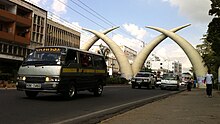Matatu

A matatu is a shared taxi in Kenya and Uganda and Kenya's most important means of public transport. The staff of a car usually consists of a driver and a companion, the Makanga, sometimes also called Manamba, whose main task is to collect payments from the passengers.
term
The name is derived from the Swahili term ma tatu "for three". This meant three shillings , a flat rate that was valid for every route during the colonial era in Nairobi . Today, matatu is also often associated with the Swahili word matata "problem", as noise, overpricing and overcrowding are attributed to the matatu as characteristic problems.
Function and organization
Meanwhile, Matatus not only drive in the city, but also in the country. Previously, it was for the vehicles mostly Peugeot - pickups with mounted cabin, now mostly by 16-seater Nissan - Minibuses with four seats each for three, and the rear bench seat for four people. In Uganda, the majority of these are 15-seater Toyota buses . The cars drive set routes, which are usually written on the body.
Matatus do not stop at specified stops, but as required by the passengers entering or exiting. Inner-city journeys in Nairobi cost between 20 and 100 Kenya shillings, depending on the destination and time of day . For example, trips to the slums are cheaper than inner-city trips during rush hour .
The drivers usually work either independently with a rental car or as employees. The vehicle owner usually has to pay a fixed price, for example 3,000 schillings per day, since employers can hardly control the income. All excess income goes to the driver and Makanga.
The wagons are often owned by business people, who sometimes maintain up to a few hundred matatus. Matatu owners must be a member of the Matatu association. All matatus must be marked with a thick yellow stripe, the driver wears a blue smock, the Makanga a red one. These three identifying features, together with a speed limiter, have only been mandatory since around 2010 in order to curb the wild growth and to at least halfway regulate the means of transport. The maximum number of passengers is indicated on the outside.
Matatus are such a central element of everyday Kenyan culture that they have spawned a multitude of legends and modern fairy tales . For example, mass emails sent warn of alleged advances by drivers who poison the passengers with a syringe from the driver's seat and then rob them when they have fallen asleep.
Problems
The model, according to which Matatu drivers often have to pay a fixed price to the car owner and live from the remaining income, often leads to a less lenient driving style, increased accident rates and excessive and improper seat occupancy. Within cities, matatus are usually overcrowded, both with passengers and bulky luggage. However, since 2004 there have been more frequent controls.
Another problem is protection racketeering with which Matatu operators, but mostly Makangas and drivers, are confronted. Matatu operators in their home town can be stopped to make payments by local protection racketeers regularly or even at every passage. In and around Nairobi, the Mungiki are particularly known for extorting protection money. In addition, the criminal organization sometimes demands to be able to provide either the driver or the makanga of a matatus himself in order to share in the daily income. The Mungiki, who are recruited from the Kikuyu ethnic group , have corresponding counterparts in other regions. For example, the Makanga is forced to pay 50 schillings when driving into a certain area, and if the payment is not made, property damage or bodily harm is the result.
Appearance

Several vehicles, especially in Nairobi, are equipped with lighting systems, flickering LED tubes, flat screens and music systems, similar to the interior of a discotheque. Especially in Nairobi, but also in Mombasa, passengers wave several matatuses if they can afford it and wait a long time to be stuck in traffic with their favorite music. Some matatus have Christian or humorous sayings on the back such as "God saves you" or "Disco-King".
See also
Web links
Individual evidence
- ↑ Kenya: Why Mungiki Will Not Relent in Pursuing Cash From Matatus allafrica.com of October 14, 2009 (English).
